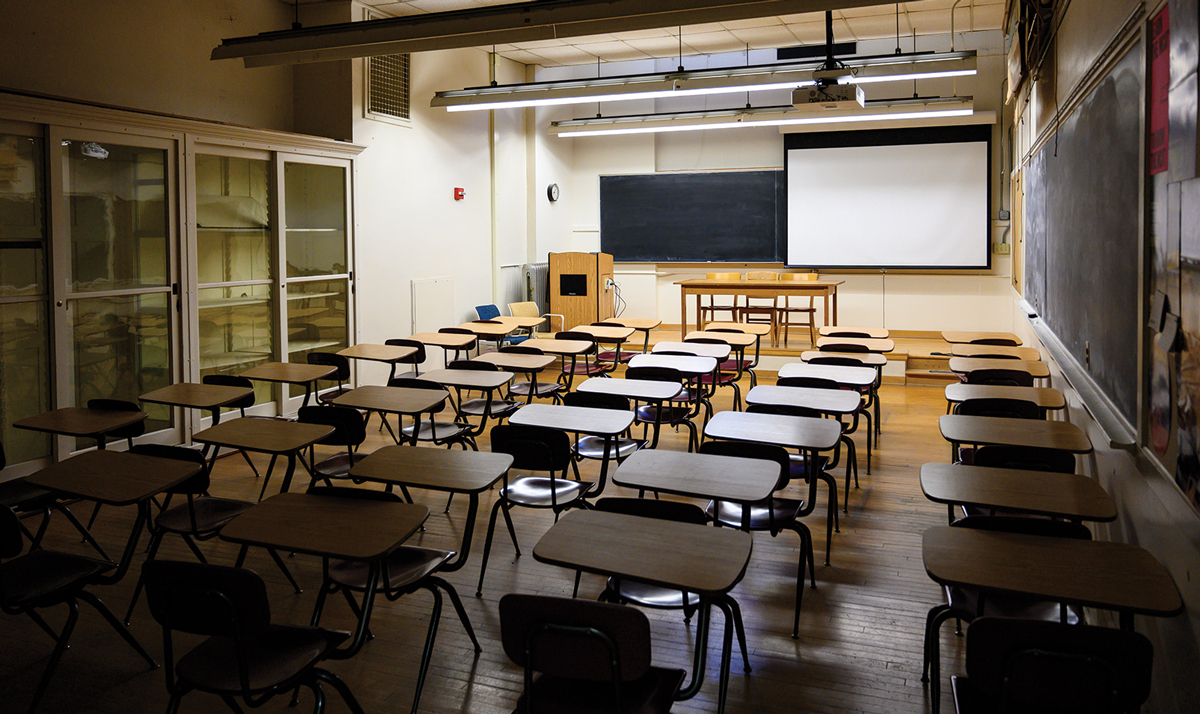
The Coronavirus Semester
A time line of the campus reaction to COVID-19
Dear Fellow Badgers
Chancellor Rebecca Blank finds reasons for hope in challenging times. Read statement >>
In March 2020, UW–Madison did something it had never done before: it shut down all in-person instruction. After Friday the 13th and until the end of the spring semester, no lectures, seminars, or lab sessions would meet; all instruction would be done remotely. Dire warnings about the novel coronavirus forced the UW to become an online university.
The action was new, but it wasn’t entirely without precedent. In the fall of 1918, the UW also responded to the threat of pandemic by closing some classes. “All large lecture courses and recreational gatherings of students were suspended during the period of the Spanish influenza epidemic,” noted the Wisconsin Alumni Magazine, predecessor to On Wisconsin.
The influenza pandemic of 1918–19 was one of the most harrowing periods in history. More than half a million Americans died, and between 50 million and 100 million people worldwide. The 1920 Badger yearbook lists victims among the dead of World War I: “Floyd Allen Ramsay 1920, died of Spanish Influenza near Nevers, France … Eugene Washburn Roark died of Spanish Influenza October 18, 1918, while in training at the naval aviation ground school … Carl Searle 1915 died at the Johns Hopkins Hospital, Baltimore, Maryland, on October 9, 1918, of Spanish Influenza.”
And yet there’s nothing else directly discussing the closure. The university’s official reaction merited only that one sentence, tucked on page 37 of the alumni magazine — with no date for when the decision went into effect or when it ended.
It’s easy to imagine why the campus community thought this needed so little coverage. It must have been traumatic, even for a country at war. The Badgers on campus in 1918 must have thought they would never forget the events of the great influenza pandemic. And perhaps they never did. But a hundred years later, they’re gone, and their memories with them.
When the UW began taking steps to halt the spread of a new pandemic, we at On Wisconsin decided we should record them —and not only for current alumni. Future generations will wonder what steps the university took and when. This is for them.
December
01
Doctors in Wuhan, China, document the first case of respiratory illness of unknown cause. It’s eventually linked to a newly discovered variety of coronavirus. The resulting ailment is named COVID-19 for coronavirus disease 2019.
January
21
The United States reports its first case of COVID-19, in Washington state.
24
University Health Services executive director Jake Baggott issues a statement about coronavirus and offers guidance: wash hands often and stay home when sick.
29
UW provost John Karl Scholz issues a statement discouraging nonessential travel to China due to the coronavirus outbreak.
30
A person who had been traveling in China arrives at UW Hospital exhibiting COVID-19 symptoms. On February 5 tests confirm that this is Wisconsin’s first (and America’s 12th) confirmed COVID-19 case. UW doctor Nasia Safdar MS’02, PhD’09 treats the patient, who recovers.
February
26
Chancellor Rebecca Blank issues a statement encouraging students and faculty to be mindful of international travel warnings before embarking on spring break.
Study-abroad programs in South Korea and mainland China are suspended. Students are advised to return to their permanent residences and to self-quarantine for 14 days.
29
The CDC announces the first American death linked to COVID-19, in Kirkland, Washington.
March
04
Faculty and staff returning from Italy, South Korea, and mainland China are asked to self-quarantine for 14 days, while those returning from lower-risk countries are asked to self-monitor.
09
Blank issues a statement discouraging students, faculty, and staff from all nonessential travel outside of Dane County.
11
At a news conference, Blank announces that, at the start of spring break, students living in university residence halls will be asked to leave campus and return to their permanent residences. Exceptions are made for those who can’t return home, such as international students. When courses resume on March 23, they will not be in person but delivered via “alternate methods” — online — until April 13.
The Wisconsin Alumni Association cancels all alumni events through April 30.
"We could not have students coming back from spring break, living in our dormitories. The likelihood of mass contagion was just too great. One observer of higher education likened the possibility to 'having an infected cruise liner in the middle of your campus.'"
— Provost John Karl Scholz
12
All study-abroad programs are suspended.
The Big Ten announces that the men’s basketball tournament will be played in front of empty stands; only players, coaches, and family members will be allowed to attend. Later in the day, the tournament is canceled. The Badgers, who had the top seed, were scheduled to play their first game on March 13.
The NCAA cancels the men’s and women’s
basketball tournaments.
Wisconsin governor Tony Evers ’73, MS’76, PhD’86 declares a statewide health emergency.
The NCAA announces that the women’s ice hockey tournament — in which the UW is set to face off against Clarkson — will be played in front of an empty arena. Before the game starts, the tournament is canceled.
13
Spring break begins.
The UW cancels all non-scholastic events, including the Varsity Band Concert.
The Big Ten suspends all organized team activities through at least April 6.
14
The UW Foundation establishes an Emergency Student Fund to aid those affected by the COVID-19 outbreak.
15
The Madison Metropolitan School District suspends classes until at least April 6.
UW faculty and staff are encouraged to telecommute to work.
16
All campus childcare centers close.
17
Blank announces that alternate delivery of classes will continue through the end of the semester, including final exams.
18
The UW Libraries close.
23
Spring break ends, and classes resume. According to Scholz, more than 90 percent of courses are ready to deliver online.
Blank announces that commencement will be postponed.
Access to UW buildings is restricted to essential personnel.
24
Evers issues a Safer at Home order, asking nonessential businesses to close. Its initial period begins March 25 and runs through April 24.
Campus events and travel are restricted through May 15.
26
The UW offers students a special pass/fail grading option for the spring semester.
April
01
Blank announces that online-only instruction will continue through summer term.
16
Wisconsin’s Safer at Home order is extended to May 26.
29
The university announces faculty and staff furloughs as part of a plan to address the pandemic’s financial effect. UW–Madison estimates it may face a $100 million shortfall.
"Of all the decisions we've had to make in this extraordinary time, this one has been the most heartbreaking."
— Chancellor Rebecca Blank, statement on postponing commencement
Note: News around the COVID-19 pandemic develops rapidly. This time line includes what we knew as of press time.
Published in the Summer 2020 issue

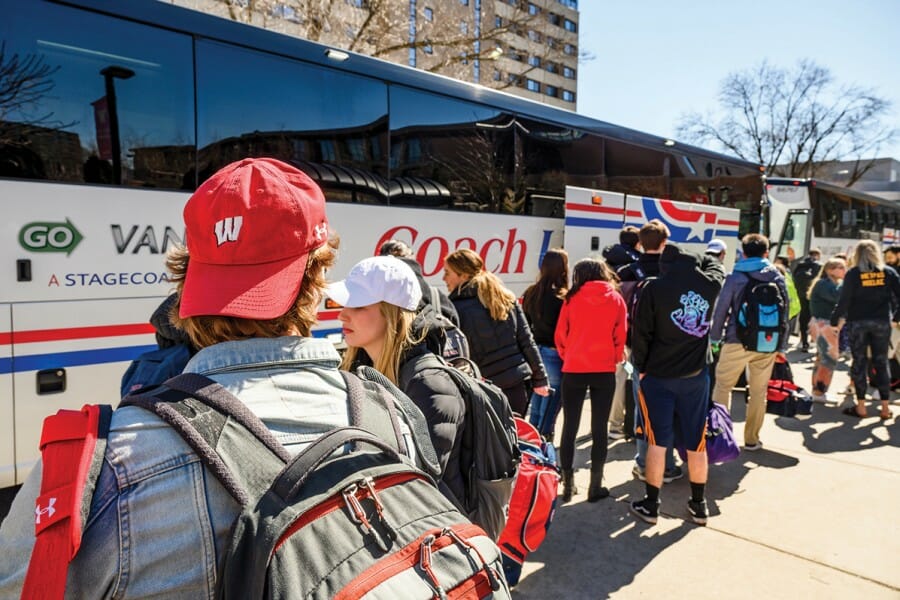

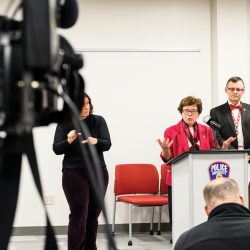
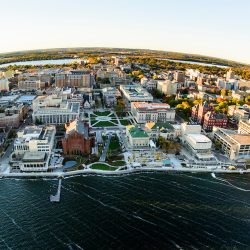
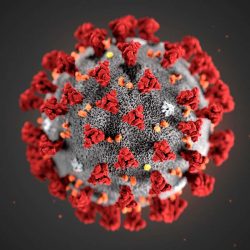
Comments
No comments posted yet.